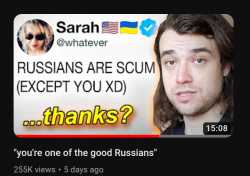>>17315356There are several factors contributing to the absence of mass protests in Russia following the invasion of Ukraine. It’s important to understand that the situation is complex and cannot be boiled down to a single reason. Some key factors include:
1. Media control: The Russian government has tight control over the majority of media outlets in the country, which can make it difficult for people to access unbiased information about the conflict. This control often leads to a narrative that supports the government’s actions and may not reflect the full reality of the situation.
2. Fear of repression: Russian citizens who speak out against the government or participate in protests risk facing severe consequences, such as arrest, imprisonment, or loss of employment. This fear of repression can deter people from openly expressing their opposition to the invasion or participating in protests.
3. Focus on daily life: Many Russians are preoccupied with their own personal struggles, such as economic difficulties or dealing with the ongoing sanctions. These challenges can make it difficult for people to prioritize political activism or engage in protests.
4. Nationalism and patriotism: Some Russians may support the government’s actions due to a sense of nationalism or patriotism. This can make it difficult for a unified opposition movement to gain traction.
5. Fragmented opposition: The Russian opposition movement is quite fragmented, and there isn’t a cohesive, organized force that can rally people to protest against the invasion of Ukraine. This lack of a unified opposition can make it challenging to mobilize large-scale protests.
Overall, it’s important to recognize that the absence of mass protests in Russia is a result of multiple interconnected factors. It’s not simply a matter of people being scared or unwilling to stand up for freedom; rather, it’s a complex issue shaped by various political, social, and economic forces.

